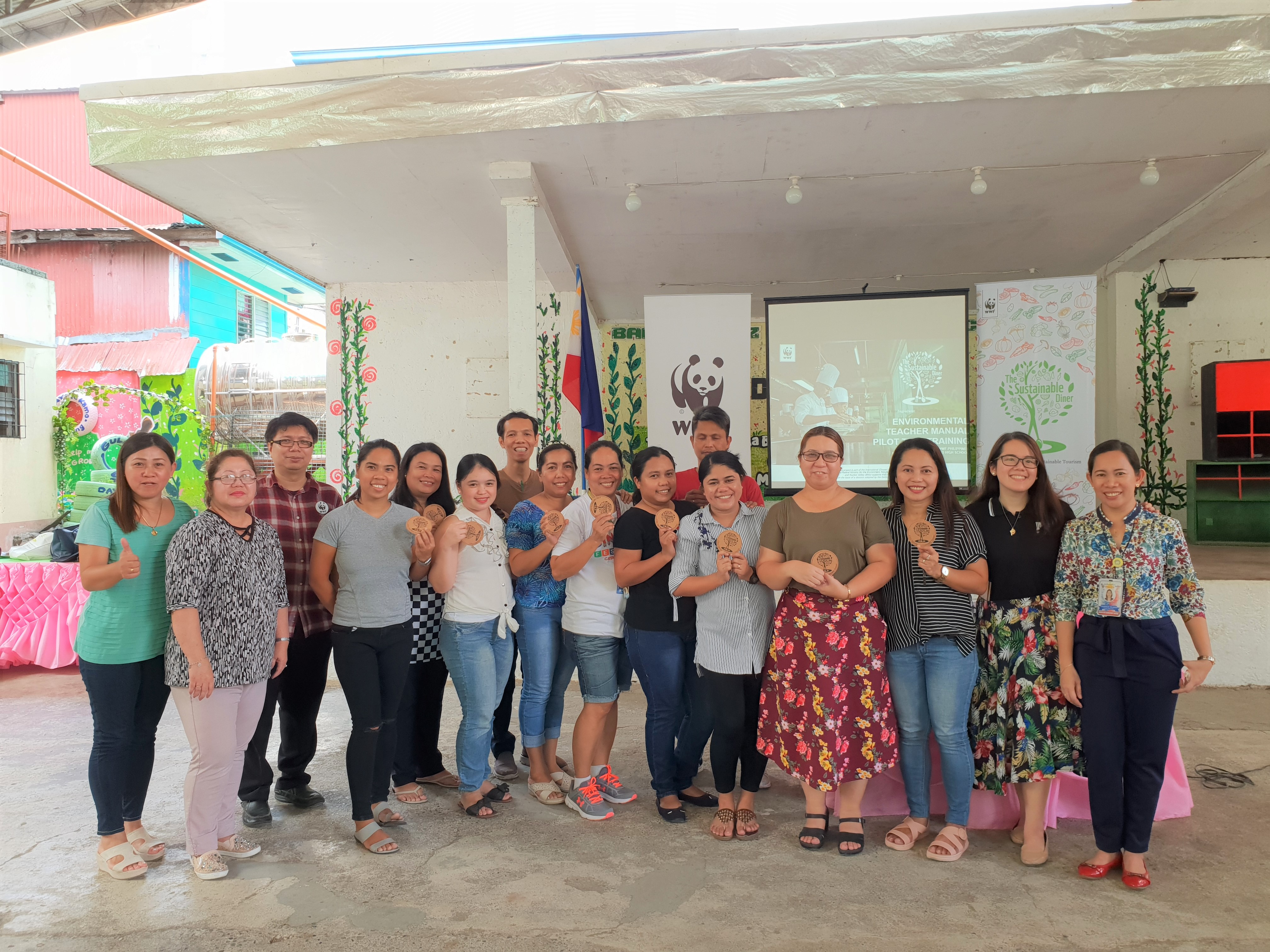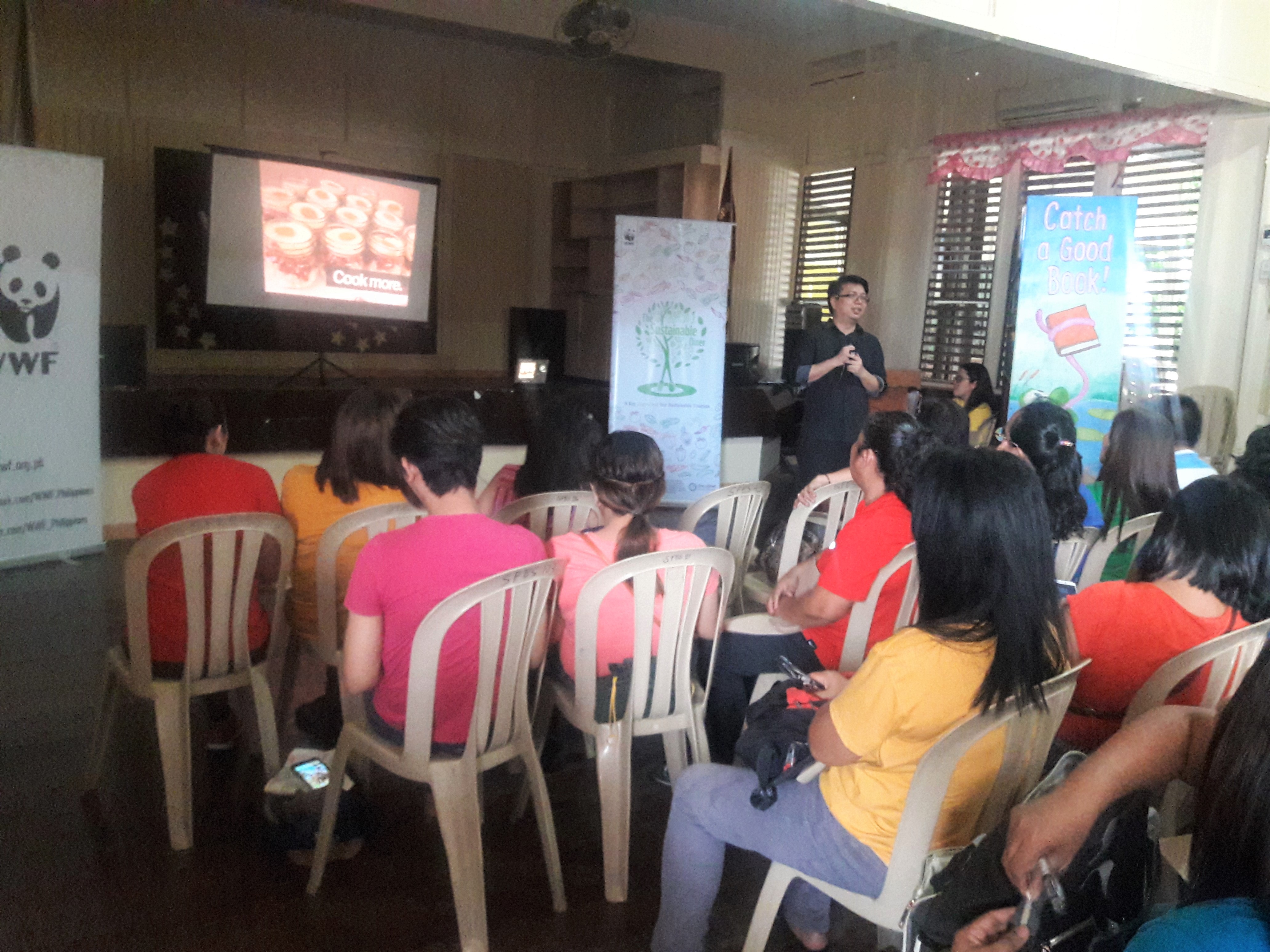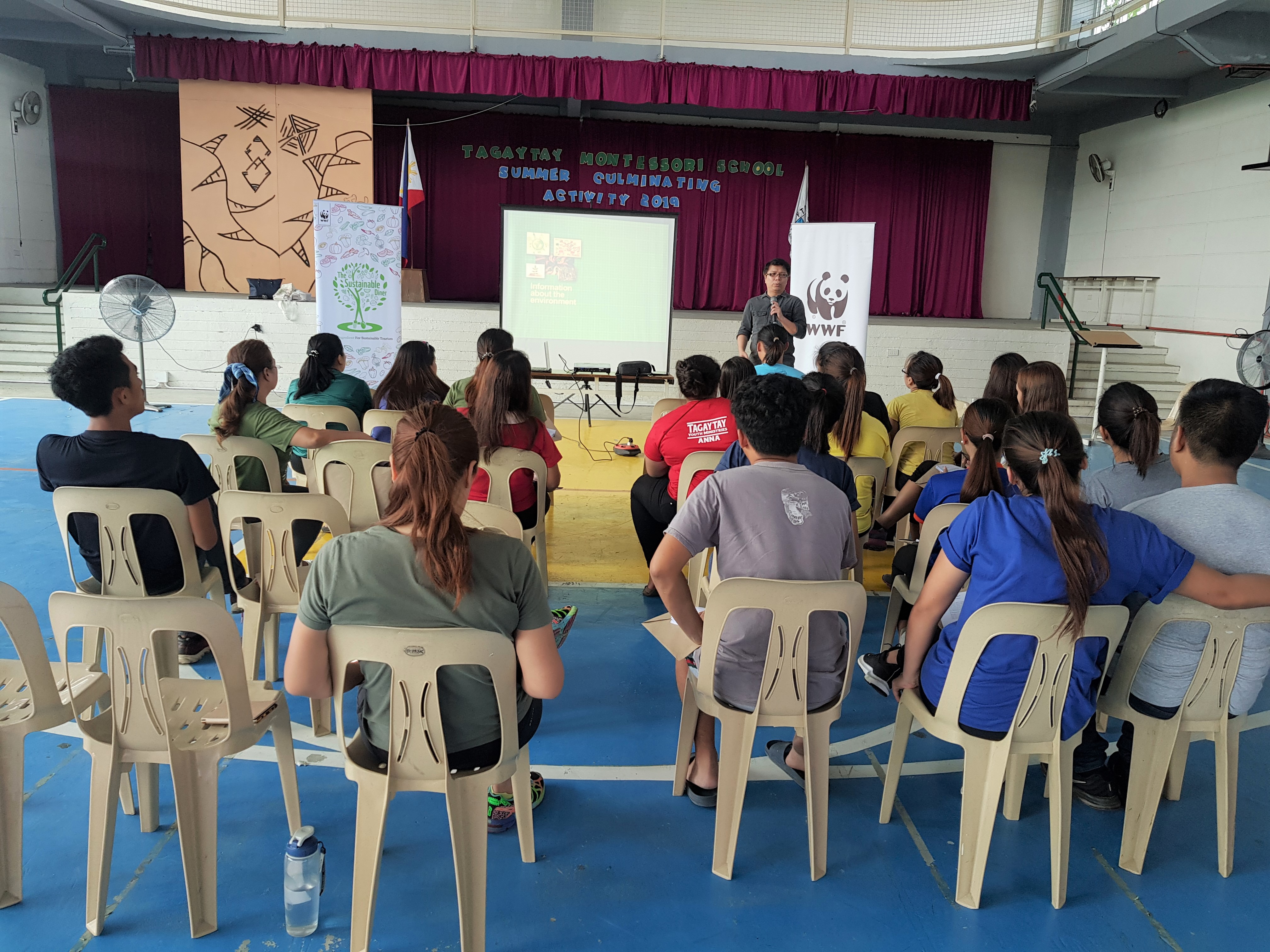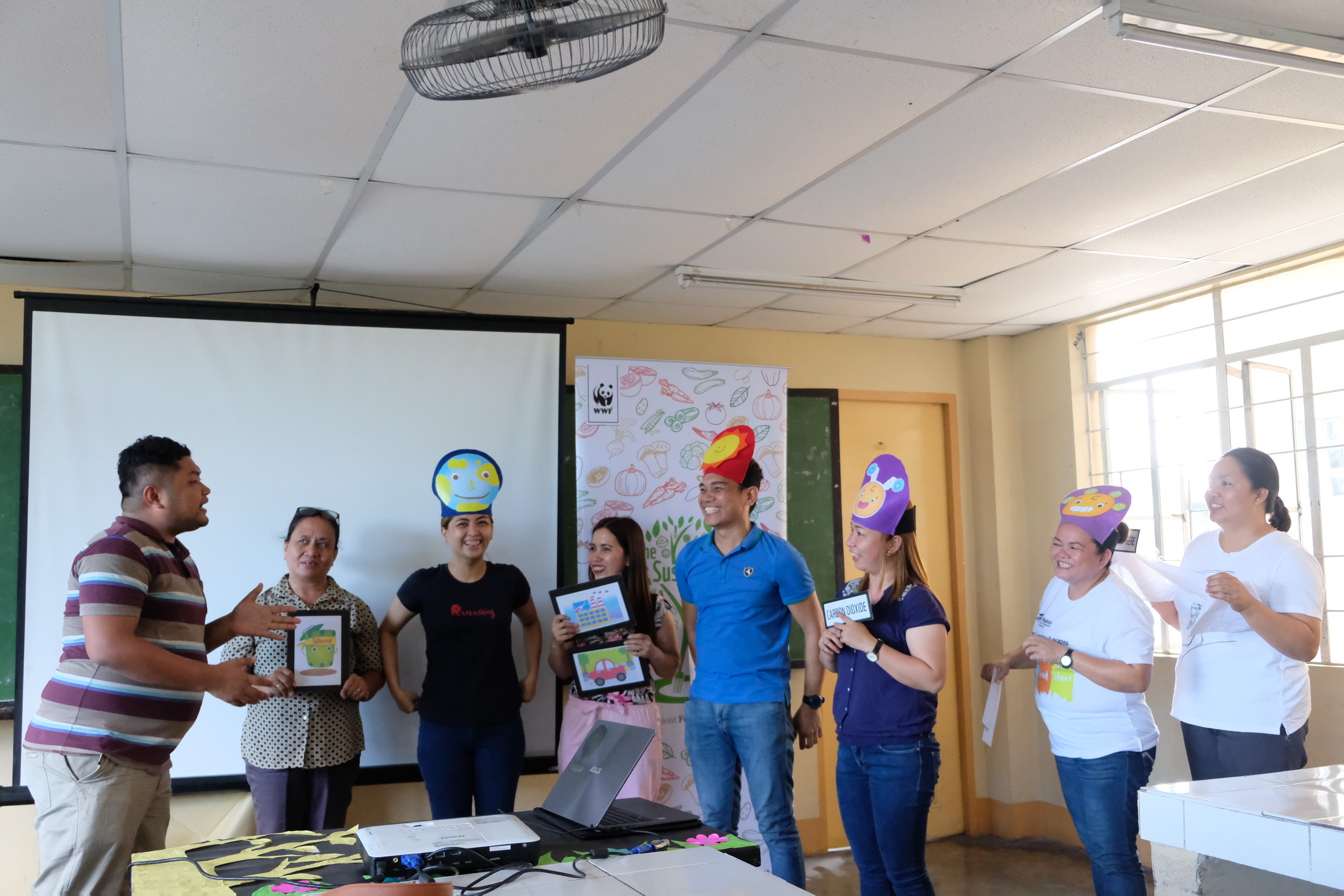Pilot Test Trainings for Environmental Teaching Manuals on Sustainable Food Systems and Sustainable Dining
June 2019

Lorayne Roque, The Sustainable Diner’s Sustainable Consumer Specialist, and Alfred Lee, the project consultant for the environmental teaching manuals, pose with Gemma Bendebel (far left), Barrio Luz High School principal, Charito Velasco (far right), Barrio Luz Elementary School principal, and faculty members in Cebu City. Photo © Lorayne Roque / WWF-Philippines
The Sustainable Diner: A Key Ingredient for Sustainable Tourism, WWF-Philippines’ pioneer project on sustainable consumption and production, has started the pilot testing for their environmental teaching manuals this May and June 2019 across different partner schools in each of the project’s key cities: Quezon City, Tagaytay City, and Cebu City. Believing that the inculcation of sustainable food practices and principles starts at a young age, the project has developed a series of environmental manuals focused on integrating general environmental topics and the effects of our food systems and dining habits on the planet into existing elementary and highschool curricula.
Last May 24, the project’s consumer education arm, led by Lorayne Roque, the Sustainable Consumer Specialist of The Sustainable Diner project, and Alfred Lee, the project’s consultant for the environmental teaching manuals, conducted the first ever pilot test training at the Barrio Luz Elementary and High School in Cebu City. Attended by Ms. Gemma Bendebel, principal of the high school, Ms. Charito Velasco, the principal of the elementary school, and Ms. Roquesa Sabejon, the supervisor for DepEd North District VII, the program started with a few words on the importance of the partnership with WWF-Philippines when it comes to educating young Filipinos about the environment, climate change, and how our personal choices can save the planet. A short introduction about WWF followed, with an explanation on the rationale behind the creation of the environmental training manuals as well as the objectives of the pilot test training. “When we first conducted our market research for the project, the results showed us that there was a knowledge gap among Filipinos when it comes to environmental issues, especially those that are directly related to food, and so we saw the need to help teach these things early on in life”, says Roque. “As teachers, we need your help and feedback in assessing these manuals, so that we are able to ensure its quality and effectiveness once rolled out. Your feedback, through our forms and short focus group discussions, is very important.”

Alfred Lee, the project consultant for the environmental teaching manuals, discussing parts of the manual with the faculty members of San Francisco Elementary School in Quezon City. Photo © Jenette Callada / WWF-Philippines
The same program was conducted at San Francisco Elementary School in Quezon City last May 27. In every pilot test training, the attending teachers would be divided into groups where they will work together to come up with a 5-10 minute mock lecture roleplaying presentation, integrating the lessons in the manual into existing subjects and lesson plans. This activity is very important because the manuals were designed to be integrated into existing lessons and subjects to make it easier to use for teachers, and are not meant to stand alone as a separate subject altogether. The presentations are then judged based on creativity, seamlessness of integration, clarity of lesson, and group participation, and the winners got to take home exclusive project cork coasters.

Alfred Lee, the project consultant for the environmental teaching manuals, conducting a short lecture on the current state of the environment with faculty members from Tagaytay Montessori in Tagaytay City. Photo © Lorayne Roque / WWF-Philippines
Tagaytay Montessori’s turn for the training happened last June 3, with the attendance of Ms. Gerby Parra, the school principal. After the training proper, Parra thanked WWF-Philippines for choosing to partner with their school and for coming up with the initiative of involving elementary and high school teachers in environmental and climate education. The project recognizes the importance of involving teachers in the continuous development of the manuals and how the integration of climate education should not be limited just to science subjects. The mock lecture competition in Tagaytay City proved that climate education can be integrated in any subject, like Mathematics, English, History, and Music, Arts, Physical Education, and Health (MAPEH). The winning group from Tagaytay Montessori was even able to integrate topics about taking care of the planet in a curriculum for advanced kindergarten.

A group of faculty members from the Justice Cecilia Munoz Palma High School in Quezon City performing their 10-minute mock lecture roleplaying presentation in front of their fellow teachers. Photo © Lorayne Roque / WWF-Philippines
The final round of the pilot test training happened at Justice Cecilia Munoz Palma High School in Quezon City last June 8. A tie-up with Our Cities 2030, one of WWF-Philippines’ initiatives that aims to use the power of youth contribution in making cities climate-smart, resilient, and sustainable, this particular run of the training included the integration of Education for Sustainable Development (ESD) in existing subjects and lesson plans. The Our Cities 2030 team opened the training with an overview of their project and a discussion on the three aspects of teaching needed for environmental and climate education - mind (information), heart (compassion), and hands (taking action). In pilot testing the manuals on sustainable food systems and sustainable dining, the teachers will be able to practically apply what they have learned about ESD.
After the four trainings, the schools will be expected to pilot test the manuals, and the feedback from these pilot tests will be used in the process of manual finalization. Finalized manuals and pilot test results will be used in a proposal for DepEd to integrate the manuals in local school curriculum. Partner schools will be given copies of the finalized manuals.
The Sustainable Diner would like to thank our partner schools for their time, participation, and continuous support in furthering the quality of climate education in the country. By working together, we believe that it is possible to start the development of sustainable habits early in young Filipinos and empower them to make choices that will contribute to the protection of our living planet!
The Sustainable Diner project, under WWF-Philippines’ Sustainable Consumption and Production, is part of the International Climate Initiative (IKI). The Federal Ministry for the Environment, Nature Conservation, and Nuclear Safety (BMU) supports this initiative on the basis of a decision adopted by the German Bundestag.
